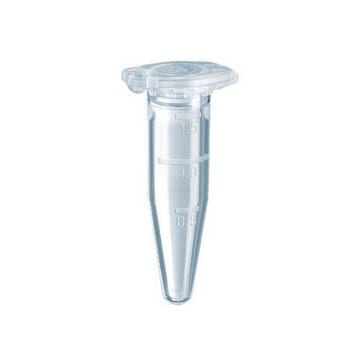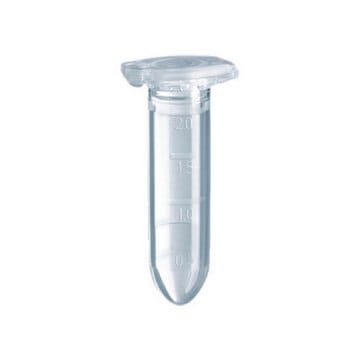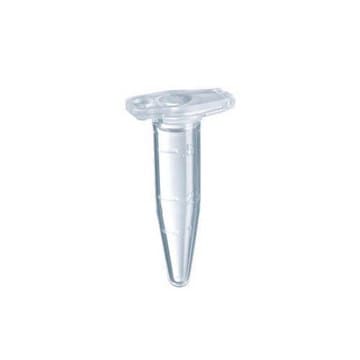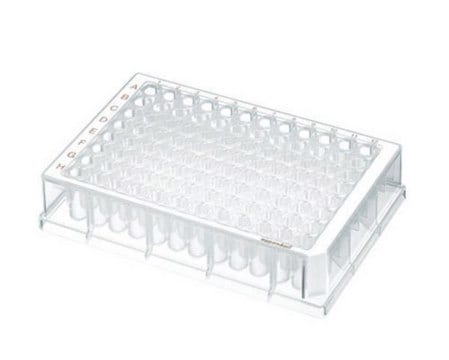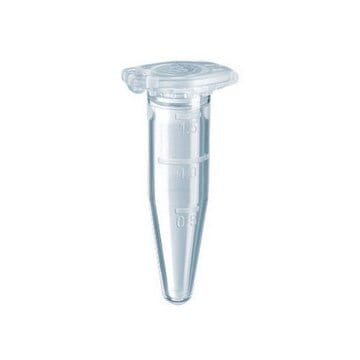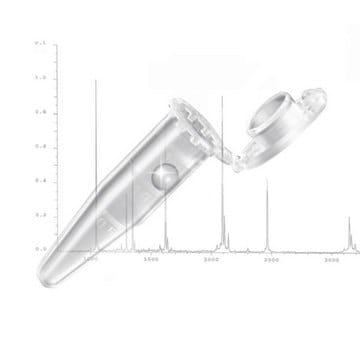EP022431005
Eppendorf® DNA LoBind tubes
capacity 0.5 mL, PCR clean, pkg of 250 ea (5 x 50ea)
Sign Into View Organizational & Contract Pricing
All Photos(1)
About This Item
UNSPSC Code:
41103037
Recommended Products
material
cap (push fit)
conical bottom
polypropylene
polypropylene cap
sterility
non-sterile
feature
DNase free
PCR clean
RCF 30,000 × g
RNase free
graduations
packaging
pkg of 250 ea (5 x 50ea)
manufacturer/tradename
Eppendorf® 022431005
capacity
0.5 mL
diam.
7.3 mm
color
clear
suitability
suitable for PCR
binding type
low binding surface
Looking for similar products? Visit Product Comparison Guide
Related Categories
General description
DNA LoBind® Tubes, snap cap, DNA LoBind®, 0.5 mL, PCR clean, colorless, 250 tubes (5 bags × 50 tubes)
- Eppendorf LoBind material ensures optimized sample recovery for improved assay results
- Free of surface coating (e.g., silicone) to minimize the risk of sample interference -
- Lot-certified PCR clean purity grade: free of human DNA, DNase, RNase and PCR inhibitors
- Available in tube, microplate, and deepwell plate formats for easy-up scaling
- Precise lid sealing for minimal evaporation rates in tube format
- Rated up to 30,000_x_g (25,000 × g for 2,0 mL) centrifugation speed for molecular biology applications
Features and Benefits
Signifcantly reduce sample-to-surface binding to ensure maximal recovery of DNA and RNA molecules
Legal Information
Eppendorf is a registered trademark of Eppendorf AG
Eppendorf LoBind is a registered trademark of Eppendorf AG
Certificates of Analysis (COA)
Search for Certificates of Analysis (COA) by entering the products Lot/Batch Number. Lot and Batch Numbers can be found on a product’s label following the words ‘Lot’ or ‘Batch’.
Already Own This Product?
Find documentation for the products that you have recently purchased in the Document Library.
Kelly Hodge et al.
Journal of proteomics, 88, 92-103 (2013-03-19)
Mass spectrometry, in the past five years, has increased in speed, accuracy and use. With the ability of the mass spectrometers to identify increasing numbers of proteins the identification of undesirable peptides (those not from the protein sample) has also
Arzu Umar et al.
Proteomics, 7(2), 323-329 (2006-12-14)
Proteomics assays hold great promise for unraveling molecular events that underlie human diseases. Effective analysis of clinical samples is essential, but this task is considerably complicated by tissue heterogeneity. Laser capture microdissection (LCM) can be used to selectively isolate target
Hongchang Qu et al.
Immunobiology, 218(4), 496-505 (2012-07-17)
Therapeutic modulation of the complement system has become increasingly important in line with the growing recognition of the role of complement in numerous diseases. Compstatin, a peptidic inhibitor that acts at the central level of the complement cascade, is currently
Graziano Colombo et al.
Free radical biology & medicine, 52(9), 1584-1596 (2012-03-06)
Cigarette smoke, a complex mixture of over 7000 chemicals, contains many components capable of eliciting oxidative stress, which may induce smoking-related disorders, including oral cavity diseases. In this study, we investigated the effects of whole (mainstream) cigarette smoke on human
Byung-Gyu Kim et al.
Proteomics, 6(4), 1166-1174 (2006-01-20)
Runx2 is a key transcription factor in osteoblast differentiation, and its activity is regulated by fibroblast growth factors (FGFs). Craniosynostosis, characterized by premature suture closure, results from mutations that generate constitutively active FGF receptors (FGFRs). We previously showed that FGF/FGFR-activated
Our team of scientists has experience in all areas of research including Life Science, Material Science, Chemical Synthesis, Chromatography, Analytical and many others.
Contact Technical Service